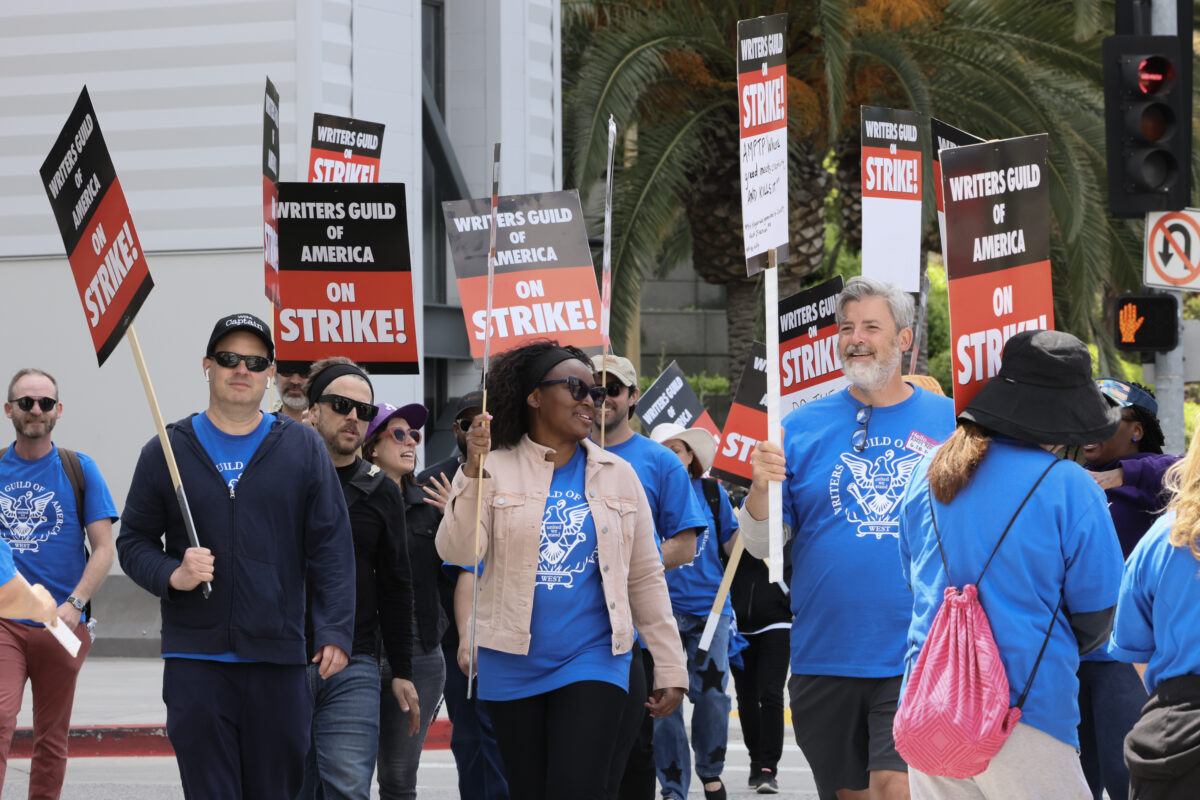
It appears the writers strike is finally coming to an end. On Sunday, the Writers Guild of America (WGA) told its members that the guild has reached a tentative deal with the Alliance of Motion Picture and Television Producers (AMPTP) on a new minimum basic agreement.
After 146 days on strike, nearly the longest in guild history, the WGA says it has reached a deal in principle on “all deal points,” which have included a revised residuals formula, regulations on so-called “mini-rooms,” a means of preserving the writers room, a residual that provides data transparency and rewards success, and protections from members’ work being replaced by artificial intelligence.
Specifics of the deal were not immediately available at press time, but told members that it would share contract language soon.
The guild has made clear that “no one is to return to work” until the contract has been ratified, but picketing is suspended.
“What we have won in this contract – most particularly, everything we have gained since May 2nd – is due to the willingness of this membership to exercise its power, to demonstrate its solidarity, to walk side-by-side, to endure the pain and uncertainty of the past 146 days. It is the leverage generated by your strike, in concert with the extraordinary support of our union siblings, that finally brought the companies back to the table to make a deal,” the WGA said in a statement. “We can say, with great pride, that this deal is exceptional – with meaningful gains and protections for writers in every sector of the membership.”
The next steps will be for the WGA to complete the “Memorandum of Agreement” with the AMPTP and then have the negotiating committee vote on sending it to the WGA West and East boards for approval. The bodies will also vote on whether to lift the “restraining order” and end the strike at a time still to be determined once the contract is ratified by members.
Leadership is tentatively scheduled to meet Tuesday, the guild says, at which point the full summary of the contract will be provided to members. The guild will also schedule meetings for members to learn more and assess the contract before voting.
It’s been a long back and forth to reach this point. The WGA and AMPTP first agreed to meet on Friday, August 4 three months into the strike, and formal negotiations resumed on August 11. At that point, the studios made what the WGA said was the AMPTP’s one and only counterproposal, and guild leadership ultimately met with top CEOs, including Bob Iger, Ted Sarandos, David Zaslav, and Donna Langley. When a deal still wasn’t reached, the AMPTP made the move to publicly release the specifics of its proposal, forcing the WGA to call that deal “not good enough.”
All that led to a stalemate of nearly a month in which both sides felt like they deserved a response from the other. Given the uncertainty, things only got uglier. Studios that had projected an end to the strike by early September started delaying movies and pausing overall deals with showrunners in waves, leaving many writers without the means to support their non-writing staffs.
Talk show hosts, most notably Drew Barrymore and WGA member Bill Maher, started to make plans to return to the air without writers employed, sparking fierce backlash online and forcing them to delay for longer. Efforts by top showrunners to schedule a private meeting with guild leadership sparked rumors of dissent, and the meeting never came to pass. The WGA also released a blistering report that called on lawmakers to bring antitrust regulation and investigate anti-competitive practices at Disney, Netflix, and Amazon, and the guild even urged individual companies to break from the AMPTP and negotiate with writers individually.
But both sides eventually returned to the table on September 20, with the CEOs Iger, Sarandos, Zaslav, and Langley all unexpectedly taking a hands-on approach in negotiations. The four remained in the room for three straight days of late night bargaining sessions but were not present on Saturday when lawyers gathered to finalize language.
Since beginning the strike on May 2, the writers have demonstrated incredible resolve. Even though there were grumblings and backchannel conversations, we didn’t see the organized pockets of dissenters trying to go around the guild as we did in the last strike. Their leverage was bolstered by SAG-AFTRA, which has been on strike since July 14, and from the International Brotherhood of Teamsters, which agreed to not cross picket lines and helped disrupt the fall TV schedule and indefinitely delay many shows and films.
The Directors Guild reached their own tentative deal with the studios back on June 4, and despite some vocal dissent from some hyphenate writers-directors, DGA membership officially ratified the new deal on June 23 with 87 percent of the 6,728 members who voted choosing to ratify it.
All eyes now turn back to the actors, who have their own demands as it pertains to a streaming revenue sharing model and a more elaborate set of protections when it comes to AI, particularly for background actors.
From the beginning, SAG-AFTRA leadership expressed a willingness to return to the negotiating table. However, the guild showed its solidarity with the WGA when it modified its interim agreement policy such that WGA-covered projects would not be eligible to sign the agreement. And talks did not resume with the actors amid the stalemate between the WGA and AMPTP.















